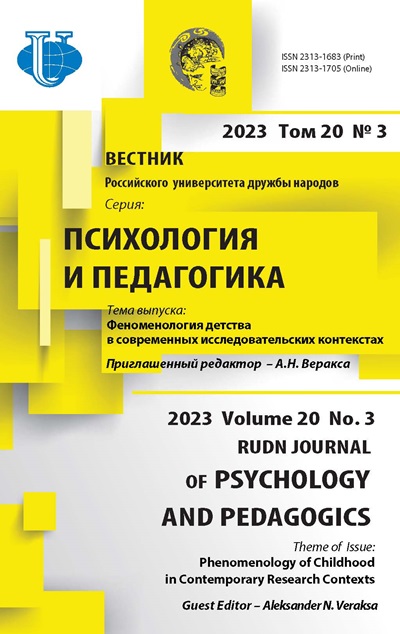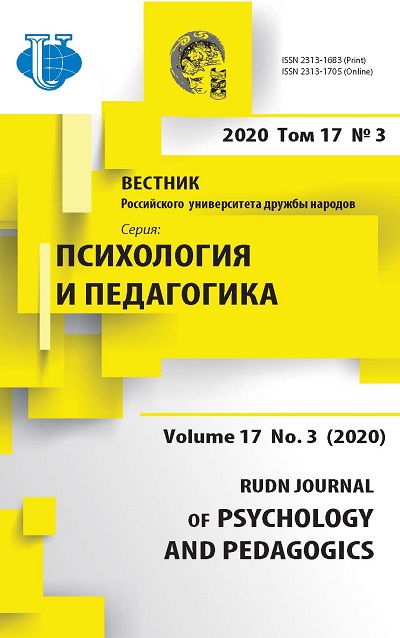Security as Part of the System of Value-Semantic Orientations of Russian National Guard Officers: A Case Study of Cadets - Officer Candidates
- Authors: Ivanov M.S.1, Utyuganov A.A.2, Yanitskiy M.S.1, Seryi A.V.1
-
Affiliations:
- Kemerovo State University
- Novosibirsk Military Institute of the National Guard of the Russian Federation
- Issue: Vol 17, No 3 (2020)
- Pages: 440-458
- Section: EDUCATION IN RUSSIA AND IN THE WORLD IN THE CONTEXT OF GLOBALISATION AND DIGITALISATION
- URL: https://journals.rudn.ru/psychology-pedagogics/article/view/24713
- DOI: https://doi.org/10.22363/2313-1683-2020-17-3-440-458
Cite item
Full Text
Abstract
The officer’s profession is of particular interest to psychology due to its deontological load and the complexity of moral and ethical foundations, when the humanistic orientation towards the protection of people and society presupposes a readiness to use the necessary violence. The study attempts to reveal this dialectic by analysing the content of the personal value-semantic sphere considered by Russian National Guard officers in terms of their professional orientation towards ensuring security. Methodologically, the study is based on the provisions of the value-semantic theory and the emerging theory of the psychology of personal security, according to which security is understood as a special value-semantic dimension that determines the subject’s attitude to danger. The purpose of the study is to identify the professional value-semantic orientations of the officers and analyse them in terms of their focus on ensuring security, in the dynamics of their formation in the process of professional training, using the example of officer candidates (cadets) of the Russian National Guard troops, whose activities have clear axiological grounds. The research base comprised all existing military institutes of the Russian National Guard troops. The subjects were cadets ( N = 779). The research methods were non-formalised written surveys, verbalised self-reports on experimental tasks, content analysis, experiment, qualitative analysis, theoretical analysis and methods of mathematical statistics. Based on the results of the study, we could identify the core values of an officer (patriotism, military duty, security of the state and society, responsibility for subordinates, military partnership and tolerance) and describe the motives for choosing a military career and professional ideas about the ideal officer (the prevailing image of a defender, a professional who is able to effectively ensure the safety and defence of the Fatherland). It was found that the value orientations of the officers as well as the sense-making motives for their choosing military careers are closely related to the focus of professional activity on ensuring security. The study showed that, under a purposeful psychological and pedagogical influence, the cadets internally accepted all the highlighted professionally important values. In this case, the value of security was the most sensitive to the influence. In the conclusions, it is noted that the value of security of the state and society is one of the elements of the system of value-semantic orientations of the officer’s personality, and it is assumed that, since other professional values of the officer are related to security in semantic unity, the professional focus on ensuring security is one of the system-forming foundations of the value-semantic orientations of the officer’s personality.
About the authors
Mikhail S. Ivanov
Kemerovo State University
Author for correspondence.
Email: ivanov.mikail@gmail.com
Ph.D., is Associate Professor at Department of Psychological Sciences
6 Krasnaya St, Kemerovo, 650043, Russian FederationAleksey A. Utyuganov
Novosibirsk Military Institute of the National Guard of the Russian Federation
Email: outioganov@mail.ru
D.Sc. in Psychology, is Head of the Department of Human and Social Sciences
6/2 Kluch-Kamyshinskoye Plato St, Novosibirsk, 630114, Russian FederationMikhail S. Yanitskiy
Kemerovo State University
Email: direktorspi@kemsu.ru
D.Sc. in Psychology, Full Professor, is Head of Department of Psychological Sciences and Director of Social-Psychological Institute
6 Krasnaya St, Kemerovo, 650043, Russian FederationAndrey V. Seryi
Kemerovo State University
Email: avgrey@yahoo.com
D.Sc. in Psychology, is Professor at Department of Psychological Sciences
6 Krasnaya St, Kemerovo, 650043, Russian FederationReferences
- Belovolov, V.A., & Pivovarov R.V. (2016). Tsennostnye orientatsii budushchikh ofitserov voysk natsionalnoy gvardii Rossii v protsesse professionalnoy podgotovki v voyennom vuze. Problems of Modern Pedagogical Education, 51, 125–131. (In Russ.)
- Crane, M.F., Boga, D., Karin, E., Gucciardi, D.F., Rapport, F., Callen, J., & Sinclair, L. (2019). Strengthening resilience in military officer cadets: A group-randomized controlled trial of coping and emotion regulatory self-reflection training. Journal of Consulting and Clinical Psychology, 87(2), 125–140. https://doi.org/10.1037/ccp0000356
- Fomenko, G.Yu. (2010). Psikhologiya bezopasnosti lichnosti: Teoretiko-metodologicheskie osnovaniya institutsionalizatsii. Chelovek. Soobshchestvo. Upravlenie, (1), 83–99. (In Russ.)
- Ivanov, M.S. (2015). Ensuring personal safety as a problem of psychology of the way of life, self-realization and personal identity. Bulletin of Kemerovo State University, 3(3), 128–133. (In Russ.)
- Ivanov, M.S., Seryi, A.V., & Yanitskiy, M.S. (2018). Mobility as strategy of providing personal security in postmodern society. The European Proceedings of Social & Behavioural Sciences EpSBS, XXXV, 1187–1196. https://doi.org/10.15405/epsbs.2018.02.140
- Jagiello, J. (2017) Professional values of military academy students. Journal Annales Universitatis Mariae Curie-Skłodowska. Sectio: Paedagogia-Psychologia, 30(2), 191–204. https://doi.org/10.17951/j.2017.30.2.191 (In Polish.)
- Klochko, V.E., & Galazhinskiy, E.V. (1999). Samorealizatsiya Lichnosti: Sistemnyj Vzglyad. Tomsk: Tomsk University Publ. (In Russ.)
- Kostousov, A.G., & Ivanov, M.S. (2017). Psychological factors of formation of security concepts in military high school cadets. Bulletin of Kemerovo State University, (2), 141–150. https://doi.org/10.21603/2078-8975-2017-2-141-150 (In Russ.)
- Kostousov, A.G., Utyuganov, A.A., Yanitskiy, M.S., & Ivanov M.S. (2017). Cadet’s representations of security and value-semantic predictors of its formation in military high school. Novosibirsk State Pedagogical University Bulletin, (5), 37–54. http://dx.doi.org/10.15293/2226-3365.1705.03 (In Russ.)
- Krasnyanskaya, T.M. (2009). Psikhologiya Samoobespecheniya Bezopasnosti. Pyatigorsk: PSLU Publ. (In Russ.)
- Kurochkin, E.A. (2016). Pedagogicheskie puti formirovaniya voennyh tsennostnykh orientatsiy u kursantov pervogo kursa obucheniya (na primere VOOVO VNG RF). Simvol Nauki, 12(2), 213–215. (In Russ.)
- Levin, E.M., Belovolov, V.A., & Bunin, S.V. (2010). Professional activity of internal troops’ officer as psychologic-pedagogical phenomenon. Siberian Pedagogical Journal, (10), 21–31. (In Russ.)
- Llera, S.J., & Newman, M.G. (2014). Rethinking the role of worry in generalized anxiety disorder: Evidence supporting a model of emotional contrast avoidance. Behavior Therapy, 45, 283–299. http://dx.doi.org/10.1016/j.beth.2013.12.011
- Moiseenko, V.G. (2015). Traditions and rituals in the context of the patriotic values formation of military. Sociological Almanac, (6), 221–233. (In Russ.)
- Niessen, C., & Jimmieson, N.L. (2016). Threat of resource loss: The role of self-regulation in adaptive task performance. Journal of Applied Psychology, 101(3), 450–462. http://dx.doi.org/10.1037/apl0000049
- Ryabkov, D.V., Belovolova S.P., & Belovolov V.A. (2016). Professional experience of officer: Axiological approach. Gumanitarnye Problemy Voennogo Dela, 1(6), 102–105. (In Russ.)
- Sahu, Jk., & Ramanujam, V. (2019). Ethics, Moral and Values in the context of Military Leadership for Gen-Y: An Indian Armed Forces Perspective Journal Article. International Journal of Management Studies, VI(2(1)), 38–47. https://doi.org/10.18843/ijms/v6i2(1)/05
- Schwartz, S., & Bilsky, W. (1987). Toward a universal psychological structure of human values. Journal of Personality and Social Psychology, 53(3), 550–562.
- Serkin, V.P. (2016). Psikhosemantika. Moscow: Yurayt Publ. (In Russ.)
- Shchyogol, A.I. (2016). Features of formation of valuable orientations of a person in military organizations. The World of Science, Culture and Education, (6), 154–157. (In Russ.)
- Shul'deshov, L.S., Rodionov, V.A., & Porshneva, E.G. (2016). Application of expert approach for determining the officer’s professionally important qualities. Humanities Scientific Researches, (2). Retrieved February 21, 2017, from http://human.snauka.ru/2016/02/14041 (In Russ.)
- Skripkin, N.P., & Belovolov, V.A. (2016). Tsennosti voyennoy sluzhby kak sotsialno pedagogichesky fenomen. In Napravleniya i Perspektivy Razvitiya Obrazovaniya v Voyennykh Institutakh Vnutrennikh Voysk MVD Rossii (pp. 190–193). Novosibirsk, NVI VV MVD Rossii Publ. (In Russ.)
- Sokolikov, O.R. (2008). Sravnitelnaya otsenka kompleksov professionalno vazhnykh kachestv ofitserov svyazi razlichnykh profiley deyatelnosti. Izvestia: Herzen University Journal of Humanities & Science, 74(2), 266–269. (In Russ.)
- Sweeny, K., & Dooley, M.D. (2017). The surprising upsides of worry. Social and Personality Psychology Compass, 11(4), e12311. https://doi.org/10.1111/spc3.12311
- Utyuganov, A.A. (2017). The place and role of axiological orientations of the individual in the system of professionally important qualities of the National Guard military officers. Bulletin of Krasnoyarsk State Pedagogical University, 1(39), 115–123. (In Russ.)
- Utyuganov, A.A. (2019). Sistema Tsennostno-Smyslovykh Orientatsii Kursantov Vuzov Natsional'noi Gvardii: Fenomenologiya i Psikhologo-Pedagogicheskie Determinanty Formirovaniya. D.Sc. in Psychology Thesis. Kemerovo: Kemerovo State University. (In Russ.)
- Vogt, J., Koster, E.H.W., & De Houwer, J. (2017). Safety first: Instrumentality for reaching safety determines attention allocation under threat. Emotion, 17(3), 528–537. http://dx.doi.org/10.1037/emo0000251
- White, C.N., Skokin, K., Carlos, B., & Weaver, A. (2016). Using decision models to decompose anxiety-related bias in threat classification. Emotion, 16(2), 196–207. http://dx.doi.org/10.1037/emo0000109
- Wortmeyer, D.S., & Branco, A.U. (2019). The canalization of morality in institutional settings: Processes of values development within military socialization. Culture & Psychology, 25(4), 589–604. https://doi.org/10.1177/1354067x19831214
- Yanitskiy, M.S., Seryi, A.V., Braun, O.A., Pelekh, Y.V., Maslova, O.V., Sokolskaya, M.V., Sanzhayeva, R.D., Monsonova, A.R., Dagbaeva, S.B., Neyaskina, Y.Y., Kadyrov, R.V., & Kapustina, T.V. (2019). The value orientations system of Generation Z: Social, cultural and demographic determinants. Sibirskiy Psikhologicheskiy Zhurnal, 72. https://doi.org/10.17223/17267080/72/3 (In Russ.)
















